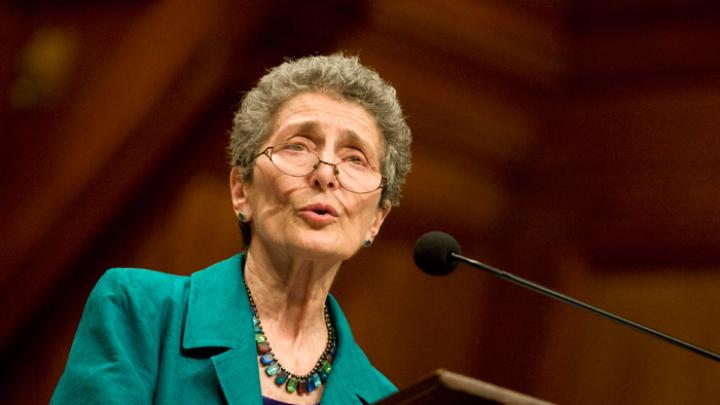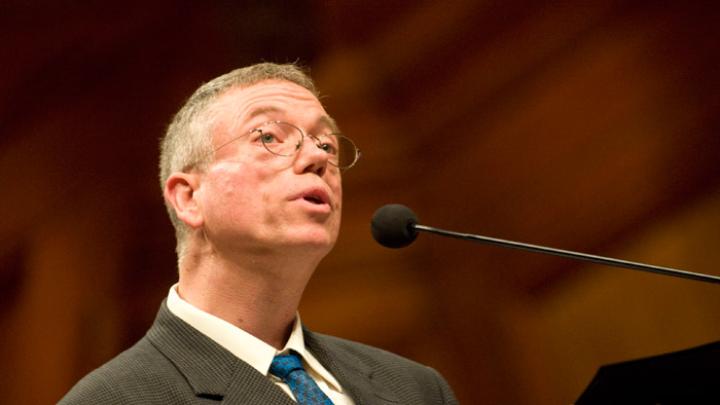The 220th Phi Beta Kappa (PBK) Literary Exercises, conducted Tuesday morning at 11 in Sanders Theatre, began the formal activities of Commencement week, providing the customary intellectual and artistic launch for the academic and emotional celebrations to follow. Lea professor of history Ann Blair, president of the PBK Alpha Iota chapter, directed the proceedings, which featured D.A. Powell reading a new poem, "Panic in the Year Zero," and renowned historian Natalie Zemon Davis, A.M. ’50, LL.D. ’96, as orator, speaking on “The Possibilities of Friendship” (see biographies and details of their presentations below). Before these featured guests came to the lectern, the chapter conducted two pieces of traditional business: recognizing distinguished teachers (as nominated by the graduating seniors who have earned PBK honors); and conferring honorary membership on members of the fiftieth-reunion class of 1960 and others, and on poet Powell, who has taught at Harvard College but was never a student at the University.
Teaching Prizes
The students’ teaching prizes were awarded to three senior members of the Faculty of Arts and Sciences. Howard Georgi, Mallinckrodt professor of physics and master of Leverett House, made the presentations to:
• Lawrence Buell, Cabot professor of American literature, who has taken a deep interest in literary explorations and expressions of conservation and the environment—read his bicentennial appreciation of Ralph Waldo Emerson from Harvard Magazine’s archives;
• Benjamin Friedman, Maier professor of political economy, a scholar of economic growth and macroeconomic policy, who has of late written and taught particularly about the moral and social consequences of economic growth—read J. Bradford Delong’s review of Friedman’s The Moral Consequences of Economic Growth here and Friedman’s prescient 2004 Harvard Magazine essay, “The Deficit Danger,” here; and
• Richard Tarrant, Pope professor of the Latin language and literature, who has published extensively on Ovid and Virgil, and who teaches the large Core course “The Rome of Augustus.”
In the day's best unscripted moment, Blair departed from the printed program, recognizing Georgi ahead of the invocation, scheduled to be presented by the Reverend Peter J. Gomes, Plummer professor of Christian morals and Pusey minister in the Memorial Church. When he was then recognized, Gomes quipped, "It's never too late for prayer."
Honorary Members
The chapter recognized the following individuals by making them honorary members, with Everett Mendelsohn, Research Professor of the history of science, making the presentations:
• William R. Alexander ’60, Ph.D. ’67, Thurnau professor of English at the University of Michigan, who founded and has worked with the Prison Creative Arts Project for two decades; a book on the project’s work has just been published by the University of Michigan Press, and Alexander was recognized for his leadership as Carnegie Foundation for the Advancement of Teaching/Council for the Advancement and Support of Education National Teacher of the Year for research universities in 2005.
• Elaine Ford ’60, professor emerita at the University of Maine, where she taught creative writing and literature; author of The American Wife, Life Designs, Monkey Bay, and other books.
• Suzanne Hodes ’60, RI '72, artist and co-founder of Artists West Studios and of Artists for Survival.
• Christopher Jones, Ph.D. ’65, Lane professor of the classics and of history, a specialist in Roman history—and a colleague of Professor Tarrant—who is concluding his active Harvard status this academic year.
• Paul G. Kirk Jr. ’60, LL.B. ’64, attorney, who most recently filled the U.S. Senate seat of the late Edward M. Kennedy ’54, LL.D. ’08, on an interim basis until the election of Scott Brown.
• Sanford Ungar ’66, journalist, former director of Voice of America, and now president of Goucher College.
• George Whitesides ’60, Flowers University Professor, a leader in nanotechnology research; see also excerpts from his recent book on the subject, with photographer Felice Frankel.
• D.A. Powell, the day’s poet.
John Harbison '60, JF '68, composer and Institute Professor at MIT, winner of a MacArthur Fellowship, the Pulitzer Prize, the Harvard Arts Medal, and many other awards, was also scheduled to be recognized, according to the program and to Mendelsohn, but he was unable to attend.
The Poet
PBK vice president Logan McCarty, assistant dean of Harvard College and lecturer on chemistry and chemical biology and on physics, introduced D.A. Powell, the poet for this year’s literary exercises. Powell has won the Lyric Poetry Award from the Poetry Society of America, the Kingsley Tufts Poetry Award, and a Paul Engle Fellowship. McCarty noted that the Kingsley Tufts prize came with a $100,000 award—a significant sum in the poetry world; Powell smiled and pointed to his shiny shoes.
A graduate of the Iowa Writer's Workshop at the University of Iowa, Powell served as the Briggs-Copeland lecturer in poetry at Harvard from 2001 to 2004. He now teaches at the University of San Francisco. Poetry, he told the Crimson, is “a cloud of subjects in opposition to one another,” and his own subjects range from AIDS to pop culture. He rose to prominence with his first collection Tea, which was followed by Lunch and Cocktails. Of this trilogy he says, “For years, as a queer man, those were the only meals I ever had. They weren’t necessarily always in the same order. Sometimes I would have cocktails when I woke up. Sometimes I would have lunch in the middle of the night.” See the Los Angeles Times review of his latest collection, Chronic.
McCarty said that in 1999, Powell noticed that his poetry-writing students were too hemmed in by the confines of a standard piece of paper, its traditional margins, and the constraint of an assumed correct poetic line, so he cut them loose--and got poems written on a candle, spray-painted on a flag, and more. Powell himself turned his writing paper sideways, began experimenting with line lengths, and created the wide format of Tea.
His new poem, Powell said, was titled for the "terrible" Frankie Avalon movie of the same name (1962), a Cold War nuclear holocaust tale. "I was filled with panic yesterday as I was finishing the poem," he said. The work was inspired by the realization that everyone has been living under the threat of some sort of extinction; the poem declares, "Enough!" he said. And with that, he read it.
Following the reading, Jameson Marvin, director of choral activities at Harvard and Radcliffe Colleges and senior lecturer on music, conducted the Harvard-Radcliffe Collegium Musicum in the second anthem of the day, his own 2001 "Each Future Song," the setting of Phillis Wheatley's verse to music. It was an evocative moment: Marvin retires at the end of this academic year, concluding 32 years of service.
The Orator
Ann Blair, invoking her authority as president, then introduced Natalie Zemon Davis--a moment that was especially moving for Blair: Davis, she said, is a towering figure in her own field, fifteenth- to eighteenth-century Europe, the early modern era from the Renaissance to the Enlightenment, and an obvious intellectual mentor. Davis, she explained, had been a founder of cultural history, which took scholars inside the lives of ordinary people—exploring religion, family and gender roles, and the meaning of self in cross-cultural encounters. The result, Blair said, was a series of "richly nuanced portrayals" of lives shaped by constraints and individuals' imaginations.
Davis's books include The Return of Martin Guerre (which according to the Holberg Prize Committee's citation “demonstrated to a broader public how an individual event in early modern France could illuminate overall mentalities and cultural contexts”), The Gift in Sixteenth-Century France, and Trickster Travels: A Sixteenth-Century Muslim Between Worlds. Acclaimed for the narrative sweep of her work, and for her bold mingling of historical methods with anthropology and literary theory, Davis remarks in the Holberg Prize Interview, “I’ve tried to write decentered history, where what happens in a woman’s workshop or a villager’s hut or at a printer’s press can count as much as decisions at a king’s council or a meeting of a Faculty of Theology.” Currently a professor of history at the University of Toronto, in 2010 she was awarded the Holberg International Memorial Prize. When asked the role of the social sciences in the twenty-first century, she replied, “One is finding a common ground and social resilience that allow people with different backgrounds, customs, and beliefs to live together in peace, justice, and mutual respect. The other is finding ways to reallocate power and resources and to develop patterns of living so that we protect our planet and its creatures and share its precious fruits.”
The citation that accompanied her honorary doctorate of laws, conferred at Commencement in 1996, reads: "A social historian whose robust research, inventive writing, and imaginative teaching recapture the élan vital of ordinary mortals in centuries past."
Davis's oration, "The Possibilities of Friendship," probed the history of Phi Beta Kappa itself, as a society originally committed to promoting learning through the bonds of friendship--a meaning, she made clear, that waxed and waned through time, as PBK became less a regular discussion and debating society than an honor society with only occasional, formal gatherings. She then deftly traced PBK's encounters with women scholars—the first admitted to membership at the University of Vermont in 1875—and the resulting debates about whether "learned sociability" would be lost by "widening the circle of scholarly excellence" to include both genders.
Turning from this institutional history, Davis then recounted the birth of the study of the history of women in the late 1960s and early 1970s—in her immediate experience, through friendship and joint study with Jill Ker Conway, Ph.D. '69 (who later became the first woman president of Smith College)--a meeting of the minds that, she said, spread across academia in the days before e-mail, with references typed on Olivettis and reading lists circulated by mimeographed copies. The intellectual progress was studded with disagreement over scholarly issues, but always "infused with friendship."
Finally, she said, friendship can be a resource in areas of "great cleavage," citing the gap between Palestinians and Israelis as described in I Shall Not Hate: A Gaza Doctor's Journey, the memoir by Izzeldin Abuelaish, M.P.H. '04, recounting his life in Gaza, his practice in Israel, and the death of three daughters when his house was shelled by Israeli troops in early 2009. His response—promoting efforts to bring about peace and humanitarian works, including his efforts to start a memorial scholarship—suggest, Davis said, that "in such ways can the star of friendship blaze anew," promoting truth, truth-telling, and understanding.
Blair thanked Davis for sharing all her skills--as cultural historian, wide and deep researcher, and advocate of hope--and delivered her "envoi" of congratulations and best wishes, before the assembled throng sang "Fair Harvard," received Rev. Gomes's benediction, as scheduled, and adjourned.









